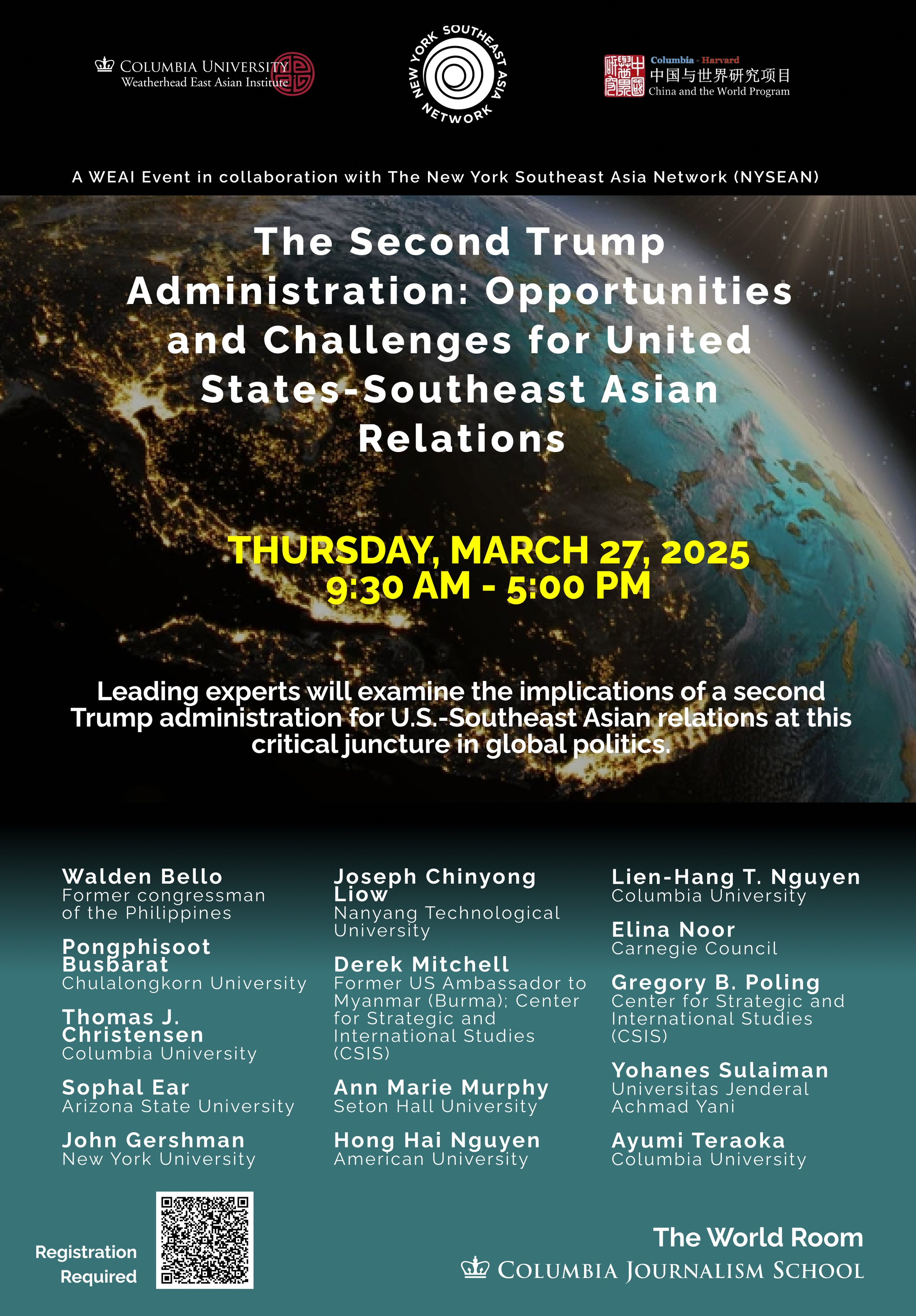Organizer: NYSEAN; Weatherhead East Asian Institute at Columbia University; the Columbia-Harvard China and the World program (co-sponsor)
Type/Location: Hybrid / New York, NY
Description:
This event will examine the implications of a second Trump administration for U.S.-Southeast Asian relations. In the aftermath of Donald Trump’s reelection, Southeast Asian states braced for a return to the transactional America First policy of his first administration. The United States promptly withdrew from global organizations and multilateral agreements such as the World Health Organization (WHO), the Paris Climate Agreement, and the Trans-Pacific Partnership while questioning the benefits of alliances like NATO and downgrading engagement with ASEAN. Washington also labeled China a peer competitor, launched a trade war, and adopted an Indo-Pacific policy that intensified pressure on Southeast Asian states to choose sides.
Given the first Trump administration’s coercive measures toward Southeast Asia, such as labeling Vietnam a currency manipulator, withdrawing GSP measures from Thailand, and threatening sanctions on Indonesia if it purchased Russian military equipment, Southeast Asian states expected the second Trump administration’s withdrawal from the WHO and Paris Agreement and its imposition of 10% tariffs on China. However, the breadth and depth of other measures that Trump has adopted since his January 20 inauguration have sent shock waves through Southeast Asian capitals. The administration’s dismantling of USAID and freeze on virtually all foreign aid has threatened programs throughout the region that traditionally generated goodwill toward Washington. Trump’s abandonment of Ukraine, rapprochement with Putin, and threats of 25% tariffs on all goods from Mexico and Canada have stunned observers.
If the United States is willing to defy its Western allies and adopt such a coercive policy toward Canada, the largest U.S. market and a NATO ally, what does that portend for its more distant Southeast Asian partners? As China, Canada, and Mexico prepare to respond with retaliatory measures, what are the implications for the global trading order and its impact on Southeast Asia’s trade-dependent states? How do Southeast Asian states perceive Washington’s wholesale abandonment of the global order it has supported since WWII, and how will they respond? This conference will address these questions and analyze potential scenarios for the trajectory of U.S.-Southeast Asian relations under the second Trump administration.
This event is co-hosted by the Weatherhead East Asian Institute and New York Southeast Asian Network, and co-sponsored by Columbia Journalism School and China and the World Program.
Speakers:
Walden Bello, Philippine academic, human rights activist, and former congressman
Pongphisoot Busbarat, Director, Institute of Strategic and International Studies, Chulalongkorn University
Thomas Christensen, James T. Shotwell Professor of International Relations, Columbia University
Sophal Ear, Associate Professor, Thunderbird School of Management, Arizona State University
Joseph Chinyong Liow, Dean of the College of Humanities, Arts, and Social Sciences, Nanyang Technological University
Derek Mitchell, Senior Advisor, CSIS, and former Ambassador to Myanmar
Ann Marie Murphy, Professor, Seton Hall University, Adjunct Senior Research Scholar, Weatherhead East Asian Institute, Columbia University
Hong Hai Nguyen, Senior Lecturer, VinUniversity, Fulbright Scholar, American University
Lien-Hang Nguyen, Director, Weatherhead East Asian Institute, Columbia University
Elina Noor, Southeast Asia Program Director, Carnegie Council
Gregory Poling, Director, Southeast Asia Program, CSIS
Yohanes Sulaiman, Associate Professor, Universitas Jenderal Achmad Yani
Ayumi Teraoka, Postdoctoral Fellow, Weatherhead East Asian Institute, Columbia University
Duy Linh Tu, Dean of Academic Affairs, Columbia School of Journalism
Registration Links:
To attend this event in person, please register here.
For non-Columbia affiliates, registration is required to access the Morningside campus. After registering you will receive an email with a QR code that must be presented along with a government-issued ID (your name must match exactly the name registered for the event) at either 116 Street & Broadway or 116 Street & Amsterdam gates for entry. Please register using a unique email address (one email address per registrant) by Mar. 26 at 4:00 pm for campus access.
To attend this event online, please register here.

